“Y’all know me. Know how I earn a livin’. I’ll catch this bird for you, but it ain’t gonna be easy. Bad fish. Not like going down the pond chasin’ bluegills and tommycods. This shark, swallow you whole. Little shakin’, little tenderizin’, and down you go.”
~Robert Shaw (Quint)
Jaws

1782 – The Continental Congress adopted the design for the Great Seal of the United States depicting a bald eagle grasping 13 arrows and an olive branch with thirteen leaves, with its talons.
The Great Seal is used to authenticate documents issued by the federal government of the U.S. and is officially used on documents such as United States passports, military insignia, embassy placards, and various flags.
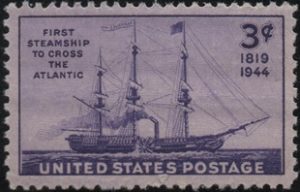
1819 – After a voyage which lasted 29 days and 11 hours, the SS Savannah arrived at Liverpool. It was the first steam-propelled vessel to cross the Atlantic, although most of the journey was made under sail.
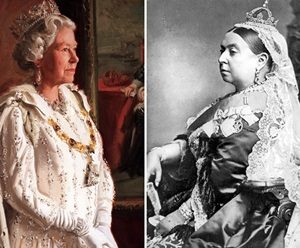
1837 – With the passing of King William IV at the age of 71, Princess Victoria became Queen of the United Kingdom.
Her reign of 63 years was the longest by any British monarch until 2015, when her great-great-granddaughter Elizabeth surpassed her.
The word “dour” often comes to mind when viewing photographs of Queen Elizabeth but she is positively radiant when compared to Victoria.

1863 – Delegates from some Unionist counties of northwestern Virginia decided to break away from Virginia, although they included many secessionist counties in the new state.
West Virginia was admitted to the Union on June 20, 1863, and was a key border state during the war. West Virginia was the only state to form by separating from a Confederate state

1867 – President Andrew Johnson publicly announced the Alaska Purchase – adding nearly 600 million square miles to the territory of the United States at a cost of $7.2 million.
The treaty between the U.S. and Russia had been signed on March 30, 1867. The U.S. Senate approved the treaty on April 9, and President Andrew Johnson signed it on May 28.
Alaska was formally transferred to the United States on October 18, 1867 although it was not until September 16, 1868, that Russia received the final payment of funds and the purchase of Alaska was completed.
For three decades after its purchase the United States paid little attention to Alaska, which was governed under military, naval, or Treasury rule; or, at times, no visible rule at all.
Skeptics had who dubbed the purchase of Alaska as “Seward’s Folly” due to Secretary of State William H. Seward’s passion for the deal were proven wrong when a major gold deposit was discovered in the Yukon in 1896, and Alaska became the gateway to the Klondike gold fields.
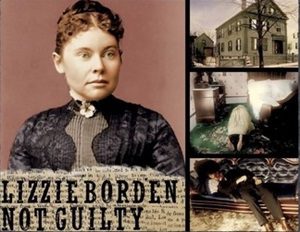
1893 – After deliberating an hour and a half, a jury of twelve men acquitted Lizzie Borden of charges she had murdered her father and stepmother in Fall River on August 4, 1892.
It is probably fair to say that, however likely it might be that Lizzie did murder her parents, the prosecution failed to meet its burden of proving guilt beyond a reasonable doubt. The state’s case rested largely on the argument that it was impossible for anyone else to have committed the crime. For the Borden jury, that turned out not to be enough for a conviction.
Had the defendant been a male, some speculate, the jury might have been more inclined to convict. One of the defense’s great advantages was that many people in 1893 found it hard to believe that a woman of Lizzie’s background could have pulled off such brutal killings.

1945 – U.S. Secretary of State Edward Stettinius Jr. approved the transfer of Wernher von Braun and his team of Nazi rocket scientists to the U.S. under Operation Paperclip.
The operation was a secret program of the Joint Intelligence Objectives Agency and largely carried out by Special Agents of the Army Counter Intelligence Corps, in which more than 1,600 German scientists, engineers, and technicians, such as von Braun and his V-2 rocket team, were recruited in post-Nazi Germany and taken to the U.S. for government employment, primarily between 1945 and 1959. Many were former members, and some were former leaders, of the Nazi Party.
The primary purpose for Operation Paperclip was U.S. military advantage in the Russian–American Cold War, and the Space Race. The Soviet Union were more aggressive in forcibly recruiting (at gunpoint) more than 2,200 German specialists – a total of more than 6,000 people including family members – with Operation Osoaviakhim during a single night on October 22, 1946.
Von Braun and his group was assimilated into NASA, where he served as director of the newly formed Marshall Space Flight Center and as the chief architect of the Saturn V super heavy-lift launch vehicle that propelled the Apollo spacecraft to the Moon. In 1975, von Braun received the National Medal of Science.
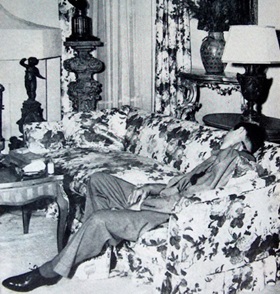
1947 – Benjamin “Bugsy” Siegel, the man who brought organized crime to the West Coast, was shot and killed in Beverly Hills. Three bullets were fired through his window, killing him instantly.
His death came as a result of what he called “a brilliant idea.” Just hours away from Los Angeles sat the sleepy desert town of Las Vegas, Nevada. It had nothing going for it except for a compliant local government and legal gambling.
Siegel bought out William Wilkerson for control of the still unbuilt Flamingo Hotel (Wilkerson was actually coerced into selling all stakes in the Flamingo under the threat of death). With $6 million borrowed from New York mobster Lucky Luciano, Siegel finished building the Flamingo Hotel and Casino.
The Flamingo wasn’t immediately profitable and Siegel ended up in an argument with Luciano over paying back the money used to build it. Around the same time that Siegel was killed in Beverly Hills, Luciano’s men walked into the Flamingo and announced that they were now in charge.

1948 – Toast of The Town, hosted by Ed Sullivan debuted on CBS.
The first telecast was produced on a budget of $1,375. Only $375 was allocated for talent and $200 of that was shared by the young stars of that night’s program, Dean Martin and Jerry Lewis.
The variety show ran under the Toast of The Town name until September 25, 1955 when it was changed to The Ed Sullivan Show and continued for another sixteen years.
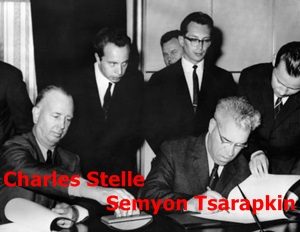
1963 – To lessen the threat of an accidental nuclear war, the United States and the Soviet Union agreed to establish a “hotline” communication system between the two nations.
The agreement (formally known in the United States as the Washington–Moscow Direct Communications Link) was signed in Geneva (photo above) and was a small step in reducing tensions between the United States and the USSR following the October 1962 Missile Crisis in Cuba, which had brought the two nations to the brink of nuclear war.
President John F. Kennedy declared, “This age of fast-moving events requires quick, dependable communication in time of emergency. This is the first step to help reduce the risk of war occurring by accident or miscalculation.”
The hotline started operations on August 30, 1963.
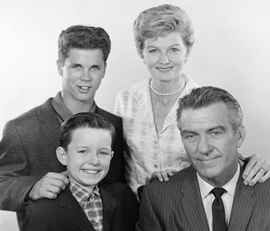
1963 – The 234th and final episode of Leave It To Beaver aired on ABC.
The show starred Jerry Mathers as Theodore “Beaver” Cleaver, Barbara Billingsley and Hugh Beaumont as his parents, and Tony Dow as Beaver’s brother Wally.
The show has attained an iconic status in the United States with the Cleavers exemplifying the idealized suburban family of the mid-20th century.
Although the show never broke into the Nielsen ratings Top 30 or won any awards during its six seasons, it placed on Time magazine’s unranked 2007 list of “The 100 Best TV Shows of All-Time.”
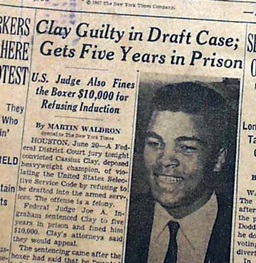
1967 – A Houston jury found Cassius Clay guilty (after only 21 minutes of deliberation) of the criminal offence of violating the Selective Service laws by refusing to be drafted. He received a 5-year prison sentence.
The former heavyweight champion had stopped using what he called his “slave name” nearly two years before, but the media still used his birth name since he had not yet legally changed his name to Muhammad Ali. In fact, he never did change it legally.
On June 28, 1971, the Supreme Court of the United States in Clay v. United States overturned Ali’s conviction by a unanimous 8–0 decision.
Justice Thurgood Marshall recused himself, as he had been the U.S. Solicitor General at the time of Ali’s conviction.
Ali remained free in the years between the conviction and the Supreme Court ruling.
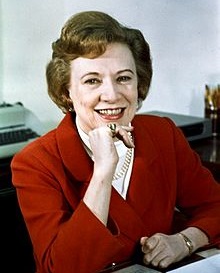
1973 – Rose Mary Woods, President Richard Nixon’s secretary, was reviewing a tape of June 20, 1972 oval office recordings when she made “a terrible mistake” during transcription.
While playing the tape, she answered a phone call. Reaching for the stop button, she said that she mistakenly hit the button next to it, the record button.
For the duration of the phone call, about 5 minutes, she kept her foot on the device’s pedal, causing a five-minute portion of the tape to be rerecorded. When she listened to the tape, the gap had grown to 18½ minutes.
The contents missing from the recording remain unknown, though the gap occurs during a conversation between Nixon and H. R. Haldeman.
Nixon claimed not to know the topic or topics discussed during the gap, but Haldeman’s notes from the meeting show that among the topics of discussion were the arrests of five men following a break-in at the Democratic National Committee headquarters at the Watergate Hotel three days earlier.
1975 – Jaws, a film that made countless viewers afraid to go into the water, opened in theaters.
The story of a great white shark that terrorizes a New England resort town became an instant blockbuster and the highest-grossing film in movie history at the time.
The film starred Roy Scheider as police chief Martin Brody, Richard Dreyfuss as marine biologist Matt Hooper and Robert Shaw as Quint, a local fishing legend.
It was set in the fictional beach town of Amity, and based on a best-selling novel, released in 1973, by Peter Benchley.
Jaws was nominated for an Academy Award in the Best Picture category and took home three Oscars, for Best Film Editing, Best Original Score and Best Sound.
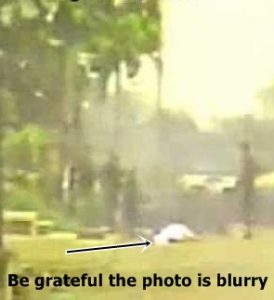
1979 – ABC News correspondent Bill Stewart was shot and killed by a Nicaraguan soldier under the regime of Anastasio Somoza Debayle.
The footage of Stewart’s killing was smuggled out of the country by his crew and all three major American networks – ABC, NBC, and CBS – ran the footage in their evening news broadcasts and repeatedly rebroadcast the clip in the following days.
Millions of viewers in the United States and worldwide reacted with shock and outrage towards the Somoza regime. President Jimmy Carter issued a statement describing the murder as “an act of barbarism that all civilized people condemn.”
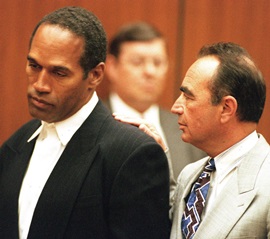
1994 – O.J. Simpson pleaded innocent in Los Angeles to the killings of his ex-wife, Nicole, and Ronald Goldman.

2001 – Andrea Yates drowned her five children, who ranged in age from 6 months to 7 years, in the bathtub in her family’s home in Houston.
In March 2002, a jury rejected the insanity defense and found her guilty. Although the prosecution had sought the death penalty, the jury refused that option. The trial court sentenced her to life imprisonment in the Texas Department of Criminal Justice with eligibility for parole in 40 years.
In 2005, the Texas First Court of Appeals reversed Yates’ capital murder conviction saying that erroneous testimony by psychiatrist Park Dietz may have prejudiced the jury. A second trial was ordered.
On July 26, 2006, after three days of deliberations, Yates was found not guilty by reason of insanity. She is currently residing at the Kerrville State Hospital in Kerrville, Texas.
Compiled by Ray Lemire ©2019 RayLemire.com. / Streamingoldies.com. All Rights Reserved.